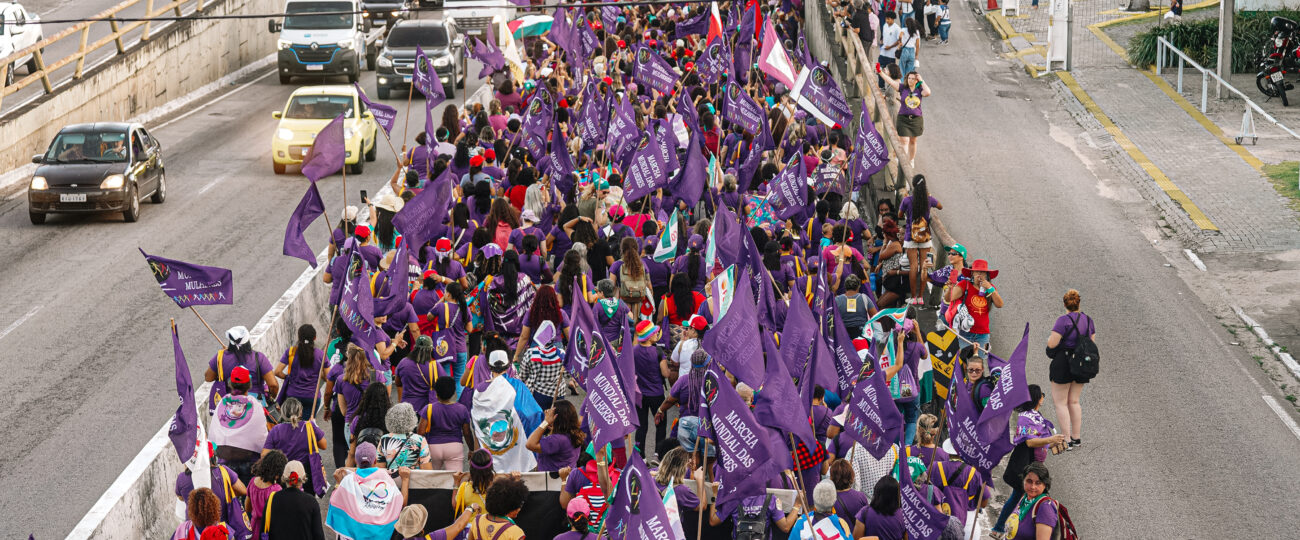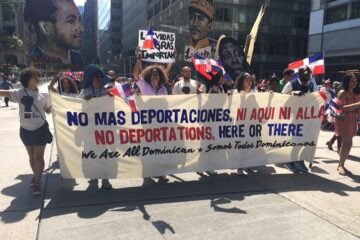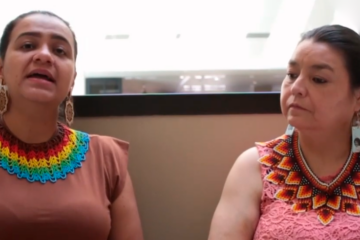2025 is the year of the 6th International Action of the World March of Women (WMW). To understand the movement’s agenda and its feminist perspectives on the current political situation, Capire interviewed Adriana Vieira and Alejandra Laprea, World March of Women activists from Brazil and Venezuela, respectively. They spoke about the organizational processes involved in the preparations for the Action and about the centrality of feminist economy as a political commitment to transforming reality. Feminist economy is one of the pillars of the Action, which also include the struggles for peace and demilitarization, for an end to violence against women, and for bodily autonomy and good living.
Adriana Vieira has been an activist with the World March of Women since it was founded in 2000. Born in a rural community in Rio Grande do Norte, northeastern Brazil, she saw the devastation of agribusiness escalate in the 1990s and joined an organization of women’s resistance in her territory. She is currently a member of the National Coordinating Board of the WMW and of the Centro Feminista 8 de Março team.
Alejandra Laprea is Venezuelan and currently one of the continental representatives of the Americas on the WMW International Committee. She first joined the movement when she took part in its 9th International Meeting in São Paulo, Brazil, in 2013. After she got back to her home country, she was in charge of engaging the national network of collectives La Araña Feminista in WMW activities, connecting the Bolivarian feminist revolution with international activism.

How do you see the organizing and mobilizing processes that happened in 2024 (like the 3rd National Meeting of WMW Brazil and the Regional Meeting of WMW Americas) leading up to the 6th International Action of 2025?
Alejandra: The preparation we’ve had during 2024 is a demonstration of work and an agenda that are built collectively, and which are not always reactive, but largely the product of collective continental reflection. What we are doing in our 6th Action is more than a campaign—it is a long process of reaching an agreement, enriching what we want to say, building proposals, and giving ourselves the necessary spaces to listen to as many people as possible. Meetings always create a very positive relationship, and we always grow from them, even when we just hug. When we meet and hug, we know and recognize how powerful we are together.
Adriana: Since the pandemic, we hadn’t had a moment to get together in the same place. From then until 2024, conservatism rose, but so did our ability to reorganize our strategy of struggle. 2024 was the moment for us to meet and reflect eye-to-eye, everyone together, providing a reading of the political situation and including our struggle and resistance in it. We have many pillars of action, very much rooted in our territories, but with an internationalist dimension and solidarity, which is important to confront the far right and the rise of conservatism in Brazil, the Americas, and globally.
International actions are moments to reposition and update the movement’s vision regarding the challenges facing feminism around the world. How do you see this task in 2025? What should we reposition more strongly at this global juncture?
Alejandra: We are at a very particular moment in history. 2025 begins with Trump’s rise to power and it has been a harsh blow to the world. Perhaps we can interpret it as a moment of intense contradictions between capital and the way we live as peoples. We are living a moment of a world war. It’s not just about the war between Ukraine and Russia, or the military attacks and genocide in Palestine. It’s a context experienced at all levels—in everyday life, in neighborhoods, in other organizations, and around the world—so the challenge we face is to find a balance between the different agendas of different sectors and thus engage in a continuous and daily reinterpretation of the context we are experiencing and continue to include feminism in everything. We need to build a response with other organizations as part of the social movements that fight in resistance and provide everyday proposals. During the 6th Action, it is important that we find a balance between making our conflicts and positions visible and also be able to participate with equal power in other spaces, including the Nyéléni forum, saying what we have to say, as grassroots feminists, about food sovereignty.
We also have commitments to truly dramatic situations, such as that of the people of Haiti. The Haitian people is being massacred, and we need to find space to amplify the voices of the women of that people, to denounce the racist policies of mass deportations that are being carried out in the Dominican Republic, for example, and to denounce how the United States is profiting from the suffering of the Haitian people, selling arms to what they now call terrorist groups and displacing populations to take over territories and plunder mother earth. What is happening this year on our continent is very complex, with blockaded territories like my country and Cuba, with migrants and masses of migrants left in limbo due to deportation laws and the treatment they are receiving.
Adriana: The violence of conservatism has been escalating dramatically around the world. Technologies and the speed at which information is exchanged help companies that have invaded our territories with wind energy, for example. We need to discuss technological sovereignty and energy sovereignty, keeping up to date with this highly connected context. Companies come into our territories in very violent ways, including by appropriating these technologies as a means of watching territories from far away. Artificial intelligence is made up of robots that have been trained, mostly by men, to watch territories, commit violence, and profit, including through mental triggers. There is an offensive and an invasion of our mental territories, with the idea that everyone thinks the same.
We have to organize fiercely to consider how to coordinate the struggles between our pillars: common goods, the fight against violence, demilitarization, feminist economy. We have to keep pursuing this new reading of reality, considering that we want to structurally change women’s lives by waging an anti-systemic struggle. Feminist economy sets the agenda for good living and shows how everything is connected. It is even worth thinking about how countries that were once members of the World March of Women are coming back this year — the women of Haiti, for example — and are back to organizing the WMW 25 years after the first International Action.
Alejandra: One of our strengths as a movement, but also as a field of work, a challenge, is to reinvent the ways in which we communicate beyond our activists. How do we manage to convey our reflections on issues that are very close to us as a movement, but which are really very strange to people outside social movements — strange in the way they are named, because perhaps they are not so strange in action. Our women are, on a daily basis, making economies from other points of view. We have the challenge of communicating our accumulated knowledge, our reflections, our passion and conviction that we will reach people who are crushed by an imposed, individualistic, and hopeless worldview, closer to a Hollywood dystopia than to the joy that should be felt in life. We are fighting for lives that are worth joy, that are visible with dignity.
How do you think feminist economy can be a tool to strengthen the building of grassroots feminism in the WMW and its alliances?
Alejandra: When I first learned about feminist economy, it was a revelation, an almost mystical moment of finding a tool that brought me closer, in such a different way, to a world that I had been taught to assume was something strange, something I shouldn’t touch. These things weren’t for me until Nalu Faria, Graciela López, Magdalena León, Alba Carosio, and Nora Castañeda told me: “This is for you.” From my experience as a woman, as a mother, as a Venezuelan, as an artist, as a communicator, I can say that feminist economy is a tool that provides a different interpretation to the reality in which we live, to reorganize the world in relation to a number of tasks, actions, and different forms of labor that sustain life.
Adriana: Feminist economy helps us understand this unequal world. It helps us learn that it’s important to move way from this dichotomy between productive and reproductive labor, and that what’s important is the work that sustains life, regardless of whether it is paid or unpaid. Feminist economy helps us to build this feminism in which all women fit. Feminist economy is not just a concept—it is a moving theory, being built from our processes, struggles, and experiences in our territories. It has this aspect of thinking about care work. There is a huge conversation about this in Brazil today and we have a very important role to play in thinking about nature, the sustainability of life, and women, because we are not an inexhaustible commodity. We are not willing, available, or energetic enough to carry out this domestic and care work alone all the time.
It also allows us to look at our territories and think about how we are going to organize ourselves. Women beekeepers are thinking about their territories and caring for nature, but they are also thinking that it is important to generate income in those territories in order to guarantee other everyday living needs. There are women fighting in their territories against the invasion of renewable energy projects that displace people and often put an end to the way of living of that area. Capitalism doesn’t consider beekeeping important when it doesn’t make a profit for itself. Women, like bees, understand that it’s important to be together.
In feminist economy, there is also the understanding of the collective, waging the struggle to ensure that what stands out is an economy that sustains life and not one that is destroying territories and nature. We need to put life above profit and not profit above everything.
Can you tell us about the activities and processes that are part of the 6th Action calendar? How do you think they fulfill the Action’s motto?
Adriana: In Brazil, we have a calendar organized around the four pillars, in such a way that all the states can take action throughout the year. Some states will carry out actions highlighting pillar 1, on common goods, for example. Rio Grande do Norte, Paraíba, and Ceará, which are three states in the northeast of Brazil, are committed to thinking about actions to protect territories and common goods. The idea is not just to have big actions in big capital cities, but to have small actions that come together as a whole. The territories feed our internationalist struggle and our principle of solidarity, which makes us organize actions. People here in Rio Grande do Norte, for example, are thinking about these wind energy companies that are coming to their territories, but there are other companies with other types of operations in Haiti, mining companies going to African countries. International actions are very important processes for us to effectively fulfill what the struggle on the ground is, what international solidarity is, what internationalism is. The power we have as a movement is diversity.
Alejandra: Right now, in the Americas, fifteen territories are organizing in different ways. From this powerful efforts as a region, we have the goal of meeting in August in Chiapas. For me, it is a triumph that, for two consecutive years, we are able to meet as a region. On this journey and in this series of reflections, we will be able to build our feminist solidarity tent together, which is the symbol we have chosen as an international movement for our 6th Action, to capture our entire journey, our joys, our sorrows, our proposals. We will then take it to Nepal for the closing of the Action, where we will find tents and proposals that may be very diverse and also very similar to ours. The building of the symbol of the feminist tent is very important because of the struggle for the meanings of what we want the world to be. We also have, as part of our continental activities, a research on migration, which is a collective and collaborative work that will involve the whole region.
It took us a long time to come up with a slogan like “We march against wars and capitalism, we defend the sovereignty of peoples and good living,” but it’s not a process that ends when we publish it, nor with the closing ceremony of the 6th Action. It is a motto that will accompany us until the next Action. Learning this motto, territorializing it and contributing to its enrichment is something that began at the latest International Meeting in Turkey. As an American, I consider it a great triumph that this motto includes terms like “people’s sovereignties” and “good living,” because it is our work taken beyond the borders of our continent. The motto is a provocation to our movements to understand how wars and the militarization of territories are manifesting in unconventional forms. What is the peace that calls us? What do we understand by peace? Why doesn’t the peace proposed to us by the European Union or Washington serve us as a people? Because it is the peace of those who can bomb, of those who can decide on life and death, of those who arm military gangs to massacre a people, of those who bomb with the permission and complicity of the entire international community of the supposedly developed world, as is happening in Gaza. We want a peace where we can live with dignity, without fear of exercising our rights, and sovereignly developing what we understand as good living.




